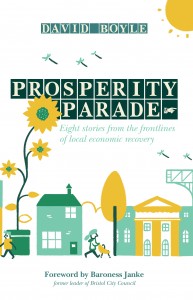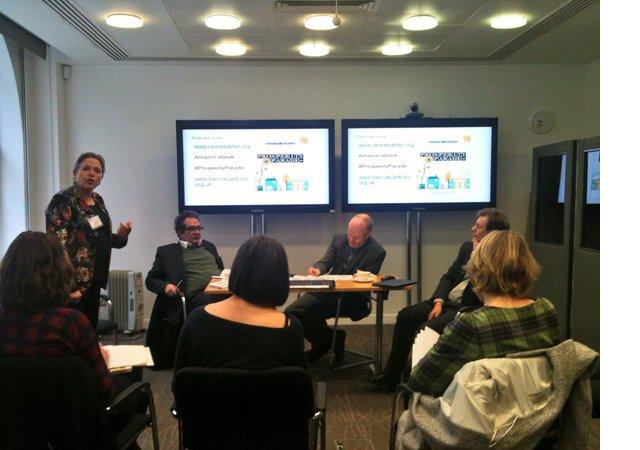 Trisha Greenhalgh and other health writers developed the idea of narrative-based medicine to explain the importance of what patients tell doctors that can’t, or doesn’t, tend to get included in data. In fact, the idea of stories as a policy-making tool has developed considerably in the health and development fields. But they have barely touched economics so far. So that’s what we need, New Weather’s David Boyle told a seminar this morning – a ‘narrative-based economics’.
Trisha Greenhalgh and other health writers developed the idea of narrative-based medicine to explain the importance of what patients tell doctors that can’t, or doesn’t, tend to get included in data. In fact, the idea of stories as a policy-making tool has developed considerably in the health and development fields. But they have barely touched economics so far. So that’s what we need, New Weather’s David Boyle told a seminar this morning – a ‘narrative-based economics’.
David was launching his book Prosperity Parade, the culmination of a project funded by Barrow Cadbury to find and tell the stories of local enterprise in action, and the emergence of the new entrepreneurial revolution.
The seminar was chaired by New Weather co-director Andrew Simms. Speaking alongside him were Lib Dem economics spokesperson Baroness Kramer, who said she feared the Treasury missed the significance of the emerging local enterprise movement because they don’t value or measure it – and consequently misses it from productivity figures.
Also Lord Glasman: “How do we link these enterprise stories up to a new form of politics?” he asked – “one that moves away from policy measures and towards the shaping of local institutions.”
And Co-ops UK chief executive Ed Mayo, who said that the old ‘John Wayne’ style of entrepreneurs did not describe those that were now emerging in cities – “and in fact doesn’t describe most entrepreneurs anyway.”
And Right Care Right Here co-ordinator Conrad Parke (Chapter 8 of the book), who explained his task to help the new Midlands Metropolitan Hospital support the health of the local economy, in order to support the health of the local population.
And New Start editor Clare Goff who talked about other stories of local enterprise emerging around the nation – aware that the seminar was taking place on the last working day before Devo-Manchester goes ahead.
But what is missing from the devo deals is how they are to shape their own local economies, and create the local institutions that will help them do so…














